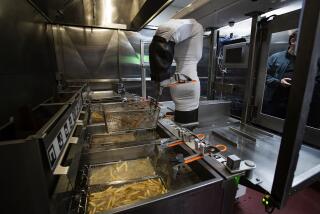Heaping Blame on Big Food
- Share via
Re “Big Food’s Aisles of Excess,” Opinion, July 20: Excuse me ... excuse me. The food police are roaming the aisles again. Greg Critser is after Kraft Foods Inc., looking for sugar. Well, Greg, buddy, you are walking through different stores and different aisles than I am. I don’t see Oreos hanging from every rafter in the store. I don’t particularly like them anyway.
I see row after row of delicatessen meats that have been reprocessed to wring out 98% of all fat and pushed back together into cardboard-tasting lumps; hamburger patties with stringy suet but no fat or taste; cheese treated the same way so you can’t tell the difference from the paper it’s wrapped in.
Try a different aisle. Watermelon and cantaloupe are so force-grown they have no taste. Fruit is picked green and shipped. And on to the milk and butter -- did I say butter? Excuse me, it’s margarine. And the milk has a blue cast to it because it is also fat-free.
Well, Critser is the author of a book -- a good one I’m sure. But he and I don’t walk down the same aisles in the markets. If he walked down the aisles I see, he would probably be looking for an Oreo fix.
Arthur E. Moore
Northridge
*
Here we go again. Add Big Food to Big Tobacco, AIDS, Big Fast Food, Big Alcohol to Big It’s Everybody’s Fault but Mine. You’ve got a problem with macaroni and cheese? Go to the fresh fruit and vegetable aisle. Problem with tobacco? Don’t smoke. AIDS got you bummed? Use a condom. Big Mac got you greased? Eat tofu. Alcohol ruining your life? Switch to bottled water. It’s called common sense and personal responsibility.
Leopold Rosenfeld
Beverly Hills
*
As a former strategy manager for Kraft Foods, I object to Critser’s vague disparaging of Big Food. Kraft and its peers do an excellent job of feeding America’s family on a budget. Consumers who choose Big Food over “Fresh Food” are simply voting with their pocketbooks. “Big” is inexpensive. “Fresh” is costly. Why? In my current role as a consultant to California farmers, I see the reason daily. Although produce farming and distribution are more efficient than ever, prices still rise. It is not that our farmers or grocery stores are making massive profits. The problem is that our state and counties are imposing massive regulation. When it takes three years and $50,000 of impact studies, permit fees and legal costs for a farmer to build a $25,000 tin shed to house his tractors (on his own farm), regulation has gone amiss.
The next time you wonder why fruit and vegetables cost more than in your youth, look no further than anti-growthers, NIMBY activists and the many layers of environmental regulations.
The next time your family budget forces a choice between Big Food and Fresh Food, realize that the prices for California produce include paying hourly rates for the thousands of farm lawyers, engineers and even financial consultants like me.
Patrick J. Garot
Beverly Hills
*
Critser’s article can be summarized as “The devil Big Food made me do it.” He gives no justification for his assertion that Big Food tells buyers what they want, rather than buyers making the choices and Big Food responding. Further, while he bemoans the influence of Big Food, he wants to use that same influence to sway shoppers’ choices. The solution is not in letting someone else continue to make our choices but in educating ourselves in what makes a healthy lifestyle.
Edward Hull
Seal Beach
More to Read
Eat your way across L.A.
Get our weekly Tasting Notes newsletter for reviews, news and more.
You may occasionally receive promotional content from the Los Angeles Times.










